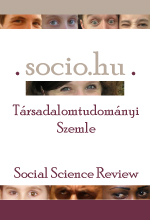A szelektív iskolaválasztás tényezői, motivációi és az oktatás minőségével való összefüggései a leghátrányosabb helyzetű térségekben
Selective school choices in disadvantaged areas: factors, motivations and relations with quality of education
Author(s): Márta KissSubject(s): Social Sciences, Human Geography, School education, Ethnic Minorities Studies
Published by: MTA TK Szociológiai Intézet
Keywords: selective school choice; segregation; integration; disadvantaged children
Summary/Abstract: It is an individually rational choice when parents decide to take their children out of a local school if the segregation has started in that institution, however this process has very harmful consequences from the perspective of society. This collective action problem leads to disadvantaged children’s bigger lag and long term to their exclusion from integration. The Give Kids a Chance Research Group of the Hungarian Academy of Sciences has led a research project comprising 23 disadvantaged areas. Based on a large representative database the following questions are analysed: how many children are taken away from local schools in these rural areas, who are they (what kind of families are they from), what are the explanatory factors of the selective school choice and whether there is a difference of quality between the local schools and mobile children’s educational institutions.
Journal: Socio.hu Társadalomtudományi Szemle
- Issue Year: 6/2016
- Issue No: 4
- Page Range: 46-72
- Page Count: 27
- Language: Hungarian

